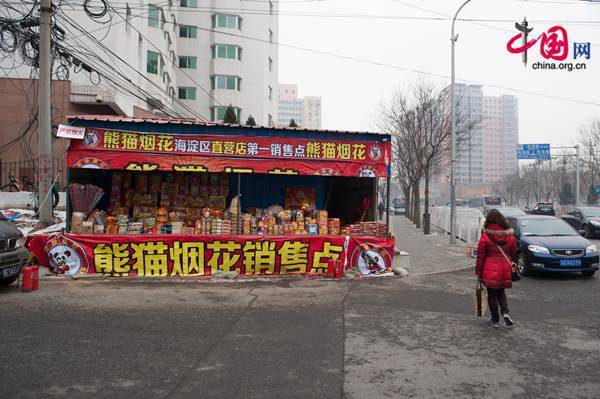Chinese firework makers look overseas
- By Chen Boyuan
 0 Comment(s)
0 Comment(s) Print
Print E-mail China.org.cn, February 17, 2014
E-mail China.org.cn, February 17, 2014
|
A fireworks booth in Beijing. Sales of fireworks have shrunk substantially this year. [Chen Boyuan / China.org.cn] |
Fireworks producers in Zhejiang Province have seen reduced sales during the recent Chinese New Year period, largely due to pervasive smog and Chinese government restrictions on when and how firecrackers can be set off.
The three major fireworks wholesalers in Hangzhou received orders for 33,000 boxes this year, down by 71 percent from 93,000 boxes last year, while the number of downtown resellers shrank to 218 from 365 last year, according to the city's administration of work safety.
But the chill in the home market has not affected the enthusiasm of some firework factories to expand their businesses. The Tonglu Fireworks Factory is looking to merge with four local firework producers, who are currently in forced suspension, to increase its competitiveness in overseas markets.
"In 2013, exports accounted for 90 percent for our total revenue of 20 million yuan (US$3.3 million), after the company shifted its focus onto the overseas market in the 1990s," said Hong Yubin, manager of the factory. He said that the government restrictions did not really affect revenue this year.
In China, fireworks are classified into four classes, A, B, C and D, according to how dangerous they are. The government tightened up restrictions this year and banned B-Class fireworks for non-certified personnel, resulting in a sales ban on this type of fireworks in ordinary shops, along with A-Class fireworks, which are always banned.
The United States, the Netherlands, and Australia are among the company's top export destinations, due to their tradition of setting off fireworks at celebrations. Hong said that cooperation with international buyers is easy to maintain, as long as products are safe.
The Tonglu Fireworks Factory is not the only factory with an eye on exports. In fact, 90 percent of the world's fireworks are made in China. The European Union's fireworks market is virtually dominated by Chinese products, according to Hong.
He said that the future merged company, while eyeing overseas markets, will still attend to the home market, but will only produce environmental-friendly sulfur-free fireworks, according to government requirements. But he did not show optimism about sales, because sulfur-free fireworks cost 3-4 times more than regular ones, so customers are less willing to buy them.
Follow China.org.cn on Twitter and on Facebook to join the conversation.







Go to Forum >>0 Comment(s)